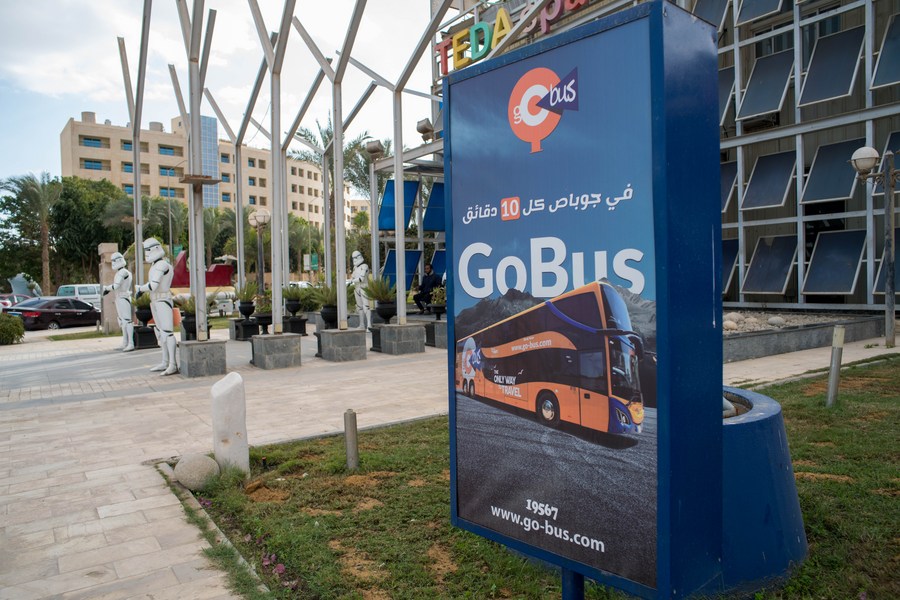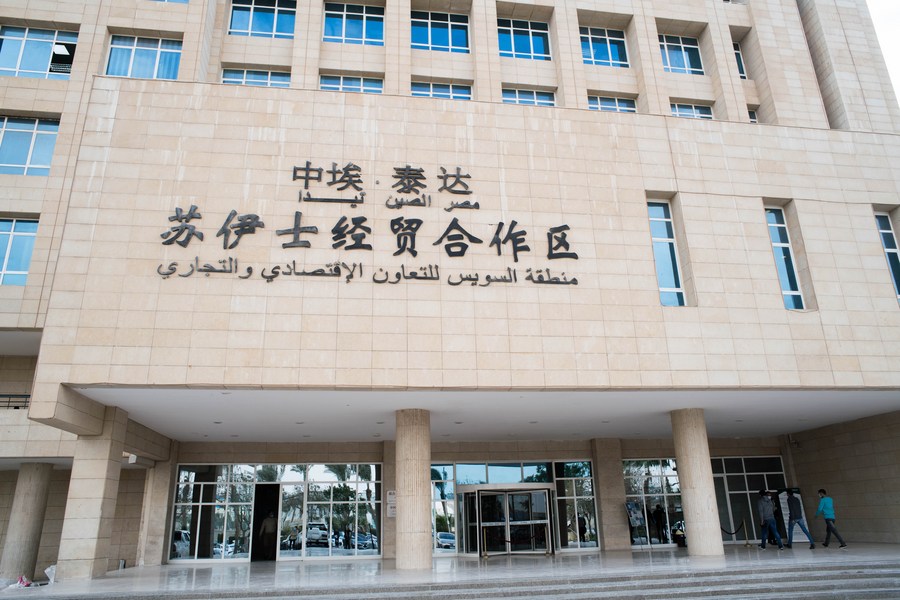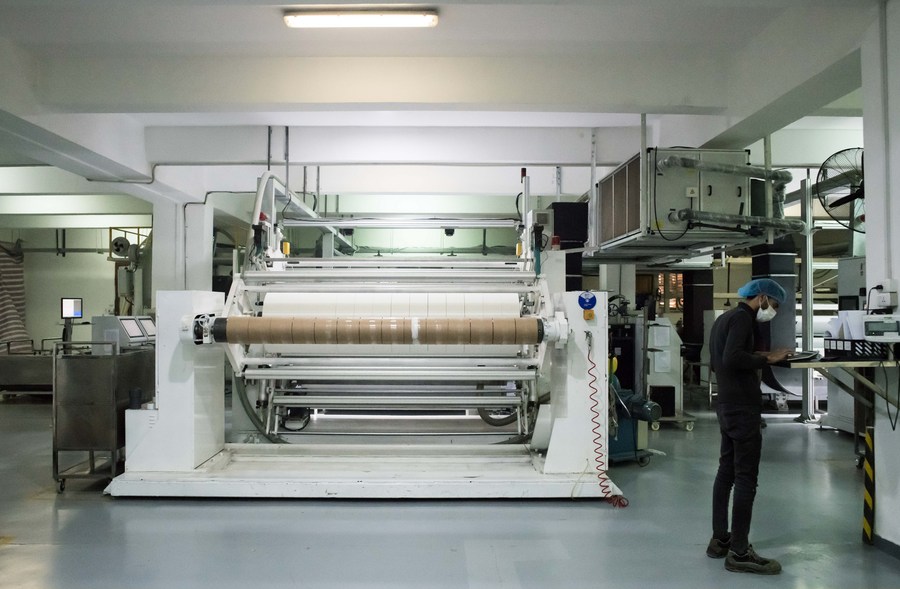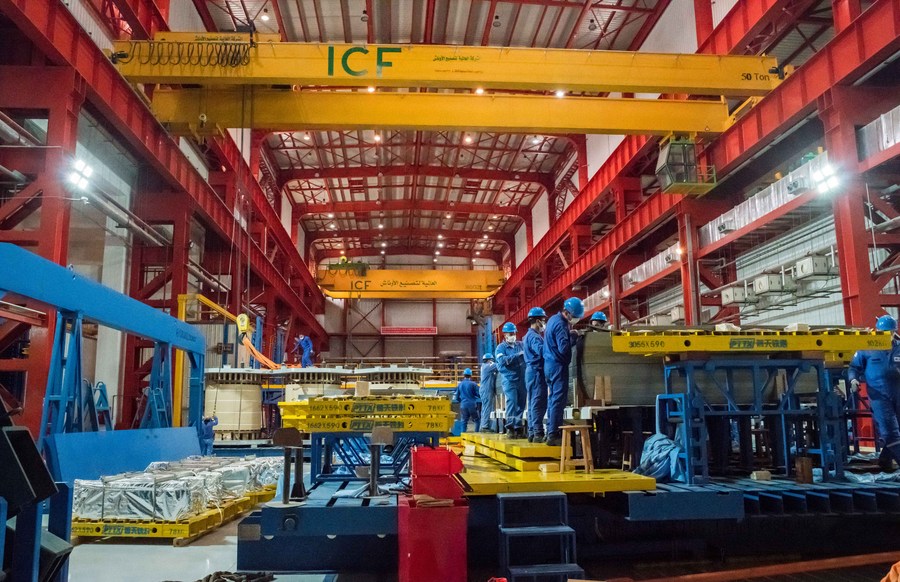
Home > Business
-According to a five-year (2016-2020) blueprint that China and Egypt signed during Xi's Egypt tour in 2016, the two sides vowed to "double their efforts" to develop the zone.
-With sales revenues exceeding 2.5 billion dollars, the businesses in the zone have paid taxes of over 176 million dollars and provided about 4,000 direct jobs and 36,000 employment opportunities in related industries.
-Having pulled through the tough year of 2020, most of the companies in the cooperation zone have full confidence that the pandemic will certainly be overcome, and new opportunities will come their way
by Xinhua writers Li Kun, Song Rui and Wu Danni
TIANJIN/CAIRO, Jan. 24 (Xinhua) -- Economic and trade cooperation between China and Egypt have given a completely fresh look to a former desert by the Red Sea near the Suez Canal and thus, literally changed its fortune.
For the convenience of thousands of new residents in and surrounding the China-Egypt Suez Economic and Trade Cooperation Zone, some 120 km to the east of Egypt's capital city Cairo, the Egyptian bus system "Go Bus" is scheduled to offer bus services to the zone within this year.
"Go Bus company chose to set stations here because of the urban community that has emerged in the zone," said Ahmed Radwan, executive director of Egypt-TEDA Investment Company.

Photo taken on Jan. 14, 2021 shows a poster of Go Bus company at China-Egypt TEDA Suez Economic and Trade Cooperation Zone in Ain Sokhna, Egypt. (Xinhua/Wu Huiwo)
On Jan. 21, 2016, during his state visit to Egypt, Chinese President Xi Jinping attended an inauguration ceremony of the second phase of the zone with his Egyptian counterpart, Abdel-Fattah al-Sisi, and the two countries agreed to expand cooperation under the Belt and Road Initiative (BRI).
Five years on, as a flagship project under the BRI, the zone that has undergone massive changes has also witnessed strengthened cooperation between the two countries.
"TEDA" MODE
In Egypt, the cooperation zone is also called "TEDA," which actually is short for "Tianjin Economic-Technological Development Area." In locals' eyes, the four letters represent not only the zone's operator, but also a development mode.
TEDA, situated about 150 km to the east of China's capital city Beijing with the Bohai Sea to its east, used to be a piece of land with saline-alkali soil. However, it became a modern industrial zone after over 36 years of development.

Photo taken on Jan. 14, 2021 shows the office building of China-Egypt TEDA Suez Economic and Trade Cooperation Zone in Ain Sokhna, Egypt. (Xinhua/Wu Huiwo)
In the 1990s, China drew up a plan to help Egypt build an economic zone in Suez. With similar geographical conditions and its own story of successful transformation, TEDA took up the task of assisting in developing the project.
In 2008, the China-Egypt Suez Economic and Trade Cooperation Zone project kicked off with the first-phase construction of a 1.34-square-km area. In 2016, heads of the two states unveiled the second-phase project, which covers an area of 6 square km.
According to a five-year (2016-2020) blueprint that China and Egypt signed during Xi's Egypt tour in 2016, the two sides vowed to "double their efforts" to develop the zone.
During his talks with Sisi, Xi suggested that the two countries work together to make Egypt a pivot along the Belt and Road. He also pledged that China will participate in Egypt's key projects, including the development of the Suez Canal Corridor and the construction of a new administrative capital.
Sisi for his part said that Egypt is ready to connect its own development plans with the BRI and called for more Chinese investment in his country.
Li Daixin, executive general manager of China-Africa TEDA Investment Co., Ltd., the developer and operator of the cooperation zone, said that thanks to the efforts of both governments, the cooperation zone has seen a "high-speed development" in the past years.
So far, the second phase of the zone has attracted 15 enterprises, and the infrastructure construction for a 2-square-km part has been finished, with supporting facilities running well.
Based on the "TEDA mode," the cooperation zone has been transformed into an industrial city rather than merely a cluster of industrial enterprises, equipped with several recreational facilities such as hotels and even an amusement park -- the TEDA Fun Valley, which attracts tens of thousands of visitors each year.
STRENGTHENING COOPERATION
By the end of 2020, the cooperation zone has attracted 96 enterprises and investment of over 1.25 billion U.S. dollars. With sales revenues exceeding 2.5 billion dollars, the businesses in the zone have paid taxes of over 176 million dollars and provided about 4,000 direct jobs and 36,000 employment opportunities in related industries.

A worker is seen at a workshop of Egypt Yanjiang New Material Co., Ltd. at China-Egypt TEDA Suez Economic and Trade Cooperation Zone in Ain Sokhna, Egypt, Jan. 14, 2021. (Xinhua/Wu Huiwo)
Yet the significance of the cooperation zone reaches far beyond.
In 2016, Xi said that China is also ready to expand bilateral cooperation with Egypt in trade, finance, space technology, energy, human resources development and security.
"These kinds of deeper cooperation are gradually being implemented, in addition to the cooperation on infrastructure construction, especially during the recent two years," Li said.
Mohamed Khaled Ghanem, executive manager of import and export with Egypt Yanjiang New Material Co., Ltd., now could give full play to his 15 years' expertise in foreign trade, as international trade has been continuously expanding in the zone.
In May 2019, the Egyptian general authority of the Suez Canal Economic Zone approved import and export trade and agreed on a bonded logistics project in the cooperation zone, making TEDA the first foreign company to carry out international bonded trade and entrepot trade in Egypt.
In December 2020, the first phase of the Chinese-funded TEDA Royal Bonded Warehouse was put into use after acceptance checks.
In the same month, Egypt's Luban Workshop was also opened, giving the cooperation zone another role -- a training base. Luban Workshop is a project supported by north China's Tianjin Municipality, home to TEDA, and concentrated on international cooperation in vocational training.
"The Egypt Luban Workshop could not only help provide stable employees (resources) for enterprises in the zone, but also cultivate talents for all kinds of projects along the Belt and Road," Li said.
ECONOMIC ENGINE
After cooperation for over a decade, Chinese and Egyptian colleagues in the cooperation zone have established close ties, which have been tested in the COVID-19 pandemic. Thanks to timely preventive measures, enterprises in the zone have quickly resumed operation.

Workers are seen at a workshop of XD-EGEMAC High Voltage Electric Equipment Co., Ltd. at China-Egypt TEDA Suez Economic and Trade Cooperation Zone in Ain Sokhna, Egypt, Jan. 14, 2021. (Xinhua/Wu Huiwo)
"We applied successful anti-virus measures to ensure zero infections in the company. We also offered extra subsidies for those who continued their work amid COVID-19," said Zhang Xiaoyu, deputy general manager of XD-EGEMAC High Voltage Electrical Equipment Co., Ltd.
Ashraf Moustafa, general director of industry with XD-EGEMAC, said that they had followed all precautionary measures, so production was not significantly affected.
Lin Xiangchun, plant manager of Egypt Yanjiang New Materials Co., Ltd, said his company had established a subsidiary in Egypt to expand business in the Middle East, Africa and Europe.
"The year of 2020 was tough, but our company has managed to balance the anti-pandemic work and routine production, gaining a year-on-year increase of 22 percent in revenues," Lin said.
In 2020, as bilateral trade between China and Egypt has weathered the COVID-19 pandemic and maintained a momentum of growth, China remains Egypt's largest trading partner.
Having pulled through the tough year of 2020, most of the companies in the cooperation zone have full confidence that the pandemic will certainly be overcome, and new opportunities will come their way, said Li, the TEDA manager.
(Zhang Xu and Ahmed Shafiq in Cairo also contributed to this story. Video reporters: Li Kun and Deng Haoran; video editor: Yang Zhixiang.)■